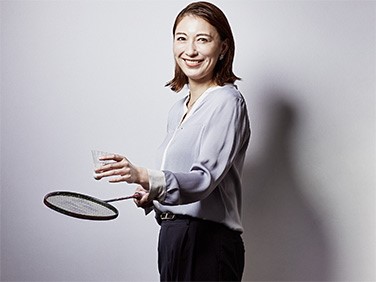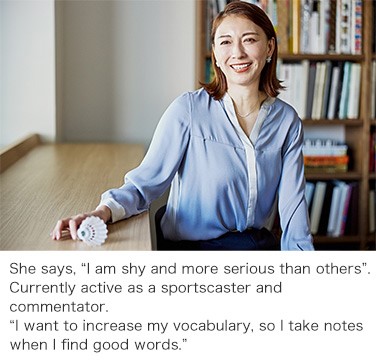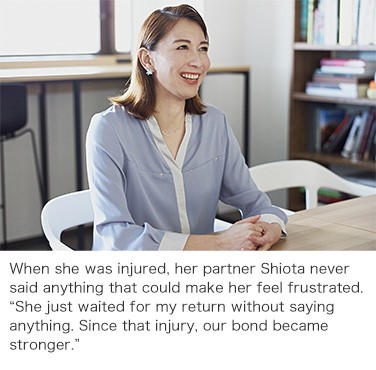Vol.3 Kumiko Ogura
I rediscovered myself by introspection and acceptance

Kumiko Ogura
(Former Japan national badminton team member; sportscaster)
At the fundamental level, sports provides an entertaining way for people to compete against each other in physical one-upmanship. But sports can also have a deeper impact, providing opportunities for personal growth and social transformation. Athletes have more than just fun on their minds as they entertain spectators with their physical feats; they also have broader goals and visions they hope to achieve through sports.
Kumiko Ogura achieved great results in womenʼs badminton doubles and created the opportunity to make badminton a popular sport. She is now active as a sportscaster. What supports her now are the words from her instructor when she was injured during her career days.
(Former Japan national badminton team member; sportscaster)
At the fundamental level, sports provides an entertaining way for people to compete against each other in physical one-upmanship. But sports can also have a deeper impact, providing opportunities for personal growth and social transformation. Athletes have more than just fun on their minds as they entertain spectators with their physical feats; they also have broader goals and visions they hope to achieve through sports.
Kumiko Ogura achieved great results in womenʼs badminton doubles and created the opportunity to make badminton a popular sport. She is now active as a sportscaster. What supports her now are the words from her instructor when she was injured during her career days.

I blamed people around me for my injury
Kumiko Ogura, wearing a spring-like light blue blouse, is a woman in a soft atmosphere making it hard to imagine how she used to compete on a worldwide level.
"I walk a lot, but hardly train. I had more muscles during my career days. I was the type of player to hit a strong smash from the back in doubles, so only my right arm was extremely big. I used to hit more than 1,000 shuttlecocks every day in those days."
Many male and female players in the Japanese badminton community are active at the international level. The pair of Kumiko Ogura and Reiko Shiota, or "Ogu-Shio", are like pioneer figures. They became partners in high school and accomplished good results at many international championships. Badminton was transformed into a major sport by them.
"I learned countless things from badminton. One of them is the words from my then instructor when I fractured my little toe in 2003. The injury occurred when I was helping another playerʼs practice. I had to be on a break for several months during the very important period as a player. It was very frustrating for me and I blamed my injury on practice and circumstances. I was almost into despair because I was not able to compete."
The instructorʼs principle was "to be a decent member of society before becoming strong as a player". She went to talk to Ogura who was "at her bottom" after withdrawing from practice due to injury. "There is a reason behind your injury." It might have been unintentional words from her trustworthy instructor, but helped her to look forward when she was looking back.
"I came back to myself when I heard her words. I got injured because I did not warm up enough and did not pay enough attention, but I was blaming it all on others. Maybe it was because I was young, like 19 or 20 years old, and was not able to think about anything except myself and was just too busy. I would also ask others for help with my own practice, but I even forgot to thank to them. I was not able to think that way.Withdrawal due to injury is often referred to "rest given by God" in the sports community, but I felt it was not true to me. I just kept thinking about myself to come up with legitimate ʻreasonsʼ and accept them. Then I started to think about why I was playing badminton and what I was trying to become. It was at that time when I was able to rediscover myself who ʻloved badmintonʼ."
Kumiko Ogura, wearing a spring-like light blue blouse, is a woman in a soft atmosphere making it hard to imagine how she used to compete on a worldwide level.
"I walk a lot, but hardly train. I had more muscles during my career days. I was the type of player to hit a strong smash from the back in doubles, so only my right arm was extremely big. I used to hit more than 1,000 shuttlecocks every day in those days."
Many male and female players in the Japanese badminton community are active at the international level. The pair of Kumiko Ogura and Reiko Shiota, or "Ogu-Shio", are like pioneer figures. They became partners in high school and accomplished good results at many international championships. Badminton was transformed into a major sport by them.
"I learned countless things from badminton. One of them is the words from my then instructor when I fractured my little toe in 2003. The injury occurred when I was helping another playerʼs practice. I had to be on a break for several months during the very important period as a player. It was very frustrating for me and I blamed my injury on practice and circumstances. I was almost into despair because I was not able to compete."
The instructorʼs principle was "to be a decent member of society before becoming strong as a player". She went to talk to Ogura who was "at her bottom" after withdrawing from practice due to injury. "There is a reason behind your injury." It might have been unintentional words from her trustworthy instructor, but helped her to look forward when she was looking back.
"I came back to myself when I heard her words. I got injured because I did not warm up enough and did not pay enough attention, but I was blaming it all on others. Maybe it was because I was young, like 19 or 20 years old, and was not able to think about anything except myself and was just too busy. I would also ask others for help with my own practice, but I even forgot to thank to them. I was not able to think that way.Withdrawal due to injury is often referred to "rest given by God" in the sports community, but I felt it was not true to me. I just kept thinking about myself to come up with legitimate ʻreasonsʼ and accept them. Then I started to think about why I was playing badminton and what I was trying to become. It was at that time when I was able to rediscover myself who ʻloved badmintonʼ."

"Letʼs first become No.1 in Japan, and compete in the world with confidence!
The Ogu-Shio pair overcame the hardship of Oguraʼs injury and accomplished a remarkable five straight wins in womenʼs doubles at the All Japan Badminton Championship the following year, with this period of break as the driving force.
"I reconfirmed my love of badminton, and remembered the importance of my partner who waited for me during my rehabilitation. During that season, we ended up competing only in the last half. As I was looking at senior players who were playing games until they were completely worn out, I learned that I would need mental strength to win at this place. We were not prepared as much as these people. Because of that break period, we were able to unite our intention to ʻbecome No.1 in Japan, and compete in the world with confidenceʼ."
The way to think about "reasons first" is still her foundation even now, 10 years after retirement.
"Although I introduce myself as a sportscaster, I am shy around new people and get nervous easily (laugh). I still have a lot of trouble at times. Even under such circumstances, I can remain calm when I think about ʻreasonsʼ. Why do I get nervous? What makes me anxious? What is my current situation and how should I react? When I organize these things in my mind for self-analysis, there is always a reason and I can find ways to improve it. By objectively looking at myself, I am able to act in a calm way."
The Ogu-Shio pair overcame the hardship of Oguraʼs injury and accomplished a remarkable five straight wins in womenʼs doubles at the All Japan Badminton Championship the following year, with this period of break as the driving force.
"I reconfirmed my love of badminton, and remembered the importance of my partner who waited for me during my rehabilitation. During that season, we ended up competing only in the last half. As I was looking at senior players who were playing games until they were completely worn out, I learned that I would need mental strength to win at this place. We were not prepared as much as these people. Because of that break period, we were able to unite our intention to ʻbecome No.1 in Japan, and compete in the world with confidenceʼ."
The way to think about "reasons first" is still her foundation even now, 10 years after retirement.
"Although I introduce myself as a sportscaster, I am shy around new people and get nervous easily (laugh). I still have a lot of trouble at times. Even under such circumstances, I can remain calm when I think about ʻreasonsʼ. Why do I get nervous? What makes me anxious? What is my current situation and how should I react? When I organize these things in my mind for self-analysis, there is always a reason and I can find ways to improve it. By objectively looking at myself, I am able to act in a calm way."
My goal is something beyond "like"
After retirement, she often goes around Japan and holds badminton classes more than 40 times a year, to continue "small challenges" by instructing mainly children.
"When I was a student, it was normal for an instructor to yell. I was also yelled at, and with such instruction, you can momentarily perform better but will try to watch out for the instructor and not be able to think on your own. That will not develop truly strong players. That is why I try to teach the joy of playing badminton to small children, and the importance of using your own brain to players who want to become stronger. Badminton requires us to use our brains a lot, so that we can understand space, read the opponentʼs moves, and execute strategy. You need to consider the "structure" of a game by keeping a clear mind at all times. It is fun because you cannot win only with your physical skills like power and speed."
Of course, there are only a handful of athletes who can shine in the world like her.
"Children cannot have very big goals, but know what they like. I liked badminton and had fun just by running after shuttlecocks on a court. I just continued it and came to have a goal, which gave me a great motivation. I think that a goal lies beyond "like". It does not have to be badminton or sports. If you can find what you like, you will have a goal. A goal will motivate you to move forward even when you hit a wall. Sports are wonderful because no one can play them well at the beginning. We repeat experiences of challenging, hitting the wall, and overcoming it many times. I think you will be strong enough to live through your life by repeating challenges, setbacks, and successes."
Oguraʼs gently talk about something beyond "like" makes us hope many children will be attracted to enjoy sports. Inspired athletes in the next generation will have their own goals and gain the strength to overcome difficulties.
"When I was a student, it was normal for an instructor to yell. I was also yelled at, and with such instruction, you can momentarily perform better but will try to watch out for the instructor and not be able to think on your own. That will not develop truly strong players. That is why I try to teach the joy of playing badminton to small children, and the importance of using your own brain to players who want to become stronger. Badminton requires us to use our brains a lot, so that we can understand space, read the opponentʼs moves, and execute strategy. You need to consider the "structure" of a game by keeping a clear mind at all times. It is fun because you cannot win only with your physical skills like power and speed."
Of course, there are only a handful of athletes who can shine in the world like her.
"Children cannot have very big goals, but know what they like. I liked badminton and had fun just by running after shuttlecocks on a court. I just continued it and came to have a goal, which gave me a great motivation. I think that a goal lies beyond "like". It does not have to be badminton or sports. If you can find what you like, you will have a goal. A goal will motivate you to move forward even when you hit a wall. Sports are wonderful because no one can play them well at the beginning. We repeat experiences of challenging, hitting the wall, and overcoming it many times. I think you will be strong enough to live through your life by repeating challenges, setbacks, and successes."
Oguraʼs gently talk about something beyond "like" makes us hope many children will be attracted to enjoy sports. Inspired athletes in the next generation will have their own goals and gain the strength to overcome difficulties.

Kumiko Ogura
Born in 1983 in Mie Prefecture. Started badminton at age 8. During the first year at Shitennoji Senior High School in Osaka, met Reiko Shiota from Fukuoka at camp training for the junior national team who became her partner. After high school graduation, joined Sanyo Electric with Shiota. Accomplished five straight wins in doubles at the All Japan Badminton Championship since 2004. Also made good results at the World Championship, making the Ogu-Shio pair popular all over Japan. Retired in 2010, and is currently a sportscaster and commentator.
Words: Kosuke Kawakami Photography: Tsukuru Asada Hair & Make-up: AKANE
── MUFG Bank supports the children of our future through the activities of Laureus. ──

